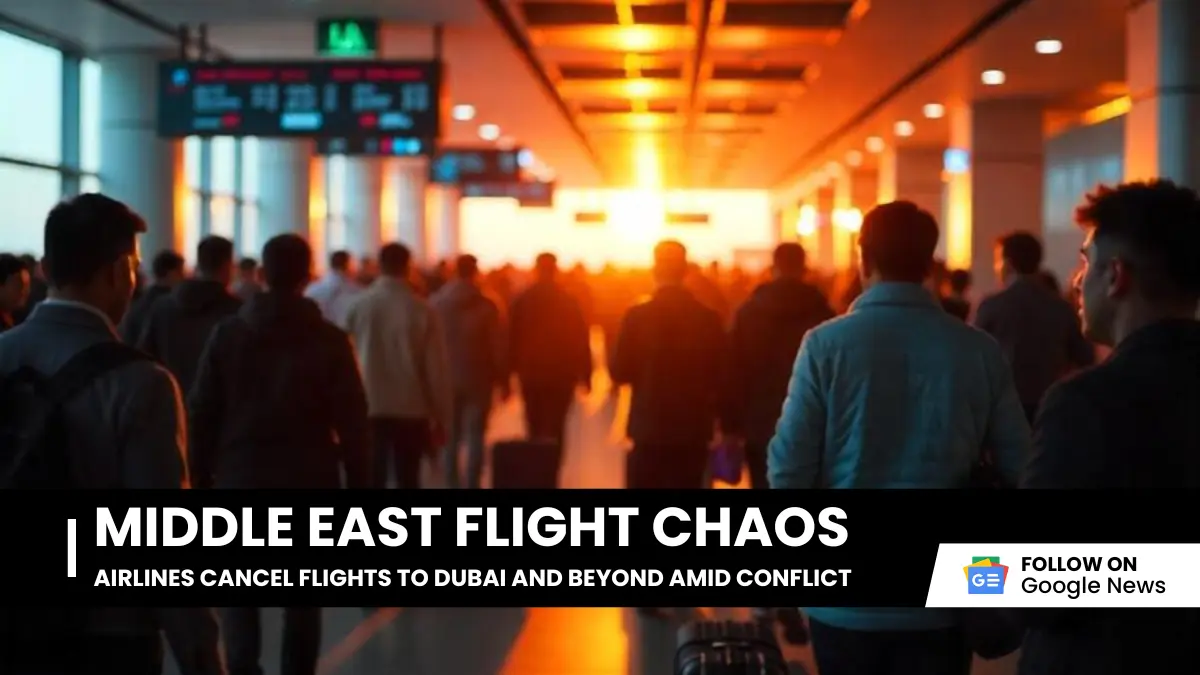The Middle East is facing major flight disruptions due to the ongoing conflict between Israel, Iran, and the United States. Since Israel began attacks on Iran on June 13, 2025, many airlines have canceled or rerouted flights to Dubai, Doha, and other key hubs. Airspace closures over Iran, Iraq, Syria, and Israel have made flying in the region risky, affecting travelers worldwide.
Why Are Airlines Canceling Flights to Dubai?
The conflict in the Middle East has led to widespread airspace closures. Iran, Iraq, and Syria have shut their skies to commercial flights, while Israel’s airspace is open only for emergency flights. These closures have forced airlines like Emirates, Flydubai, and Qatar Airways to cancel flights to Dubai and other destinations.
Flightradar24, a popular flight-tracking service, shows almost no commercial planes flying over Iran, Iraq, or Syria. Instead, flights are being rerouted over Saudi Arabia, Egypt, or Afghanistan, which increases flight times and costs. For example, Flydubai flights from Dubai to Moscow now take seven hours instead of five due to rerouting through Pakistan and Afghanistan.
Global aviation safety groups, like Safe Airspace, have warned of risks from missiles and drones in the region. Past incidents, such as the 1988 downing of an Iran Air flight and the 2020 Ukrainian jet crash, make airlines cautious. As a result, many have suspended flights to ensure passenger safety.
Which Airlines Have Canceled Flights?
Both international and regional airlines have stopped or changed their Middle East routes. Here’s a look at some major cancellations:
| Airline | Affected Routes | Suspension Period |
| Emirates | Tehran, Baghdad, Basra, Jordan, Lebanon | Until June 30, 2025 |
| Flydubai | Iran, Iraq, Israel, Syria, St. Petersburg | Until June 30, 2025 |
| Qatar Airways | Iran, Iraq, Syria | Temporary, no set date |
| Etihad Airways | Abu Dhabi to Tel Aviv | Until July 15, 2025 |
| British Airways | Dubai, Doha, Bahrain, Amman | Varies, some until June 30 |
| Singapore Airlines | Dubai | Until June 25, 2025 |
| Lufthansa | Tehran, Tel Aviv | Until further notice |
- Emirates and Flydubai: Dubai-based carriers have halted flights to conflict zones. Flydubai has also stopped accepting passengers connecting through Dubai to Iran, Iraq, or Syria.
- International Airlines: British Airways, Air France, and United Airlines have canceled flights to Dubai, Doha, and other Gulf hubs due to safety concerns.
- Regional Airlines: Qatar Airways and Etihad Airways have suspended flights to risky areas, prioritizing passenger and crew safety.
How Is Dubai Affected by Flight Cancellations?
Dubai International Airport (DXB), the world’s busiest international hub, has seen 179 delayed flights and 8 cancellations in a single day. Flydubai reported 68 disruptions, while Emirates had 68 delayed flights. These cancellations have caused chaos for travelers, with many facing delays or rerouting.
The Middle East is a vital aviation corridor connecting Europe, Asia, and Africa. Dubai, Doha, and Abu Dhabi are major hubs for airlines like Emirates, Qatar Airways, and Etihad. With Iranian and Iraqi airspace closed, flights are taking longer routes, increasing fuel and crew costs. Flightradar24 reports that Saudi Arabia’s overflights have doubled from 700 to 1,400 daily, while Afghanistan’s have risen by 500%.
Travelers to Dubai from cities like Karachi, Lahore, and Istanbul are seeing higher cancellation rates, with some routes facing 5–10% disruptions. This has led to fewer visitors and economic strain for Dubai’s tourism industry.
How Are Airlines Adapting to the Crisis?
Airlines are finding ways to cope with the Middle East conflict and airspace closures:
- Rerouting Flights: Many flights now pass over Saudi Arabia, Egypt, or the Caspian Sea to avoid conflict zones. This keeps passengers safe but adds hours to journeys.
- Flexible Policies: Airlines like Emirates and Etihad are offering refunds or rebooking options for affected passengers.
- Regional Expertise: Gulf carriers, used to geopolitical tensions, are quickly adjusting schedules and routes. Saudi airspace has become a key corridor for east-west traffic.
Despite these efforts, the situation remains uncertain. Experts say airlines may face higher costs if oil prices rise due to the conflict, which could lead to more expensive tickets.
What Should Travelers to Dubai Do?
If you’re planning to fly to Dubai, here are some tips to avoid trouble:
- Check Flight Status: Use Flightradar24 or airline websites to track your flight’s status before heading to the airport.
- Stay Updated: Follow airline advisories and news for the latest on airspace closures and cancellations.
- Book Flexible Tickets: Choose fares that allow changes or refunds in case of disruptions.
- Avoid Risky Routes: Consider flights that avoid Middle East hubs, such as Singapore or Hong Kong, for Europe-Asia travel.
Dubai Airports has warned that flights at DXB and Dubai World Central (DWC) may face delays or cancellations. Passengers should arrive early and check with their airline for updates.
How Long Will Flight Disruptions Last?
No one knows when the Middle East conflict will end, so flight disruptions could continue for weeks or months. Flydubai and Emirates have suspended some routes until June 30, 2025, while others, like Etihad, extend cancellations to mid-July. If tensions escalate, more airlines may cancel flights to Dubai and other hubs.
The aviation industry is preparing for long-term challenges. With Russian and Ukrainian airspace already closed, the Middle East’s role as a key corridor makes these disruptions especially tough. Travelers should plan carefully and expect changes.



